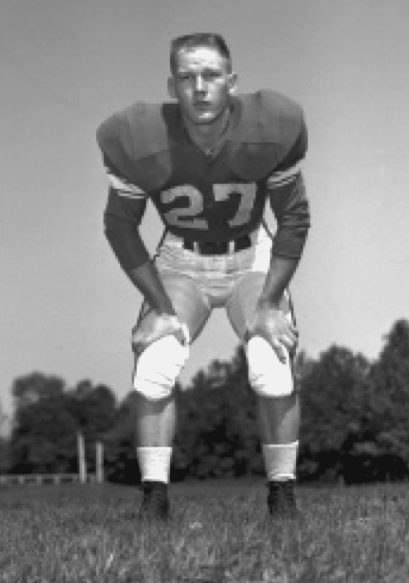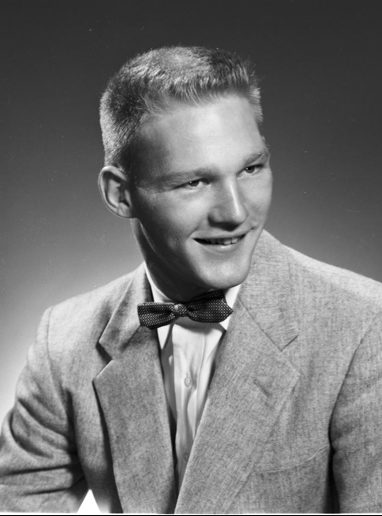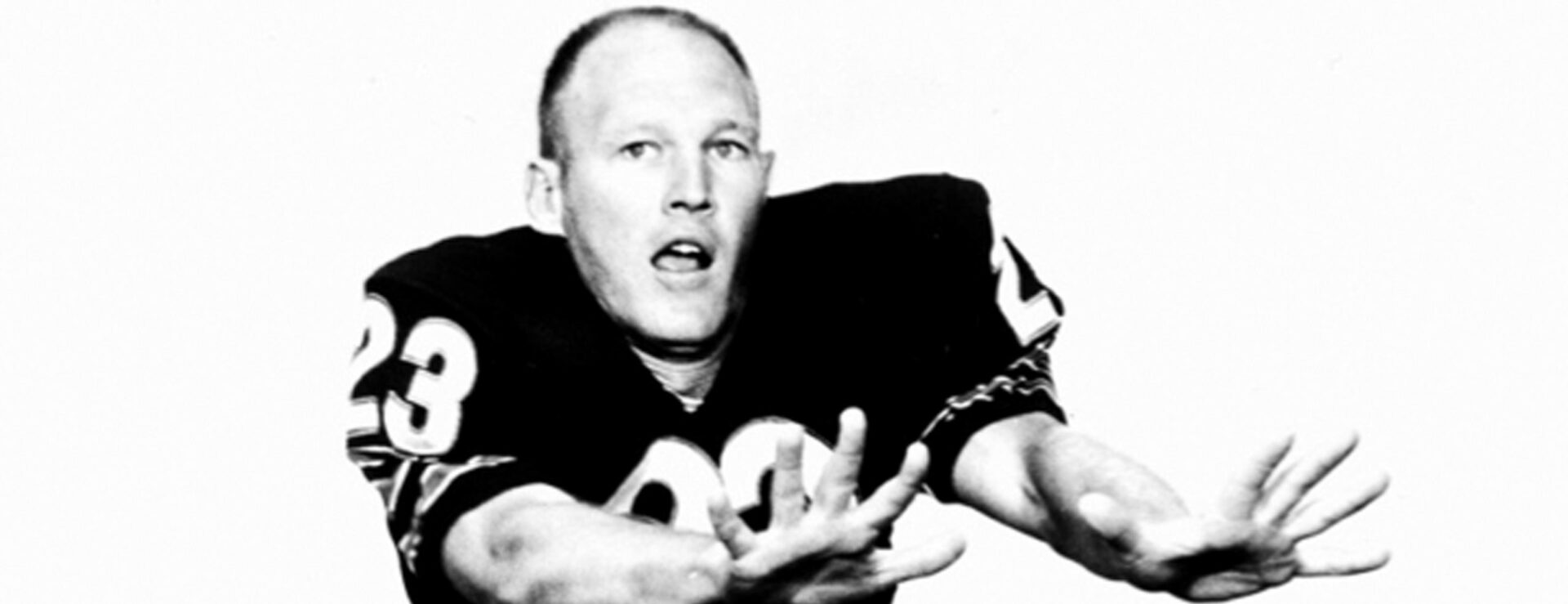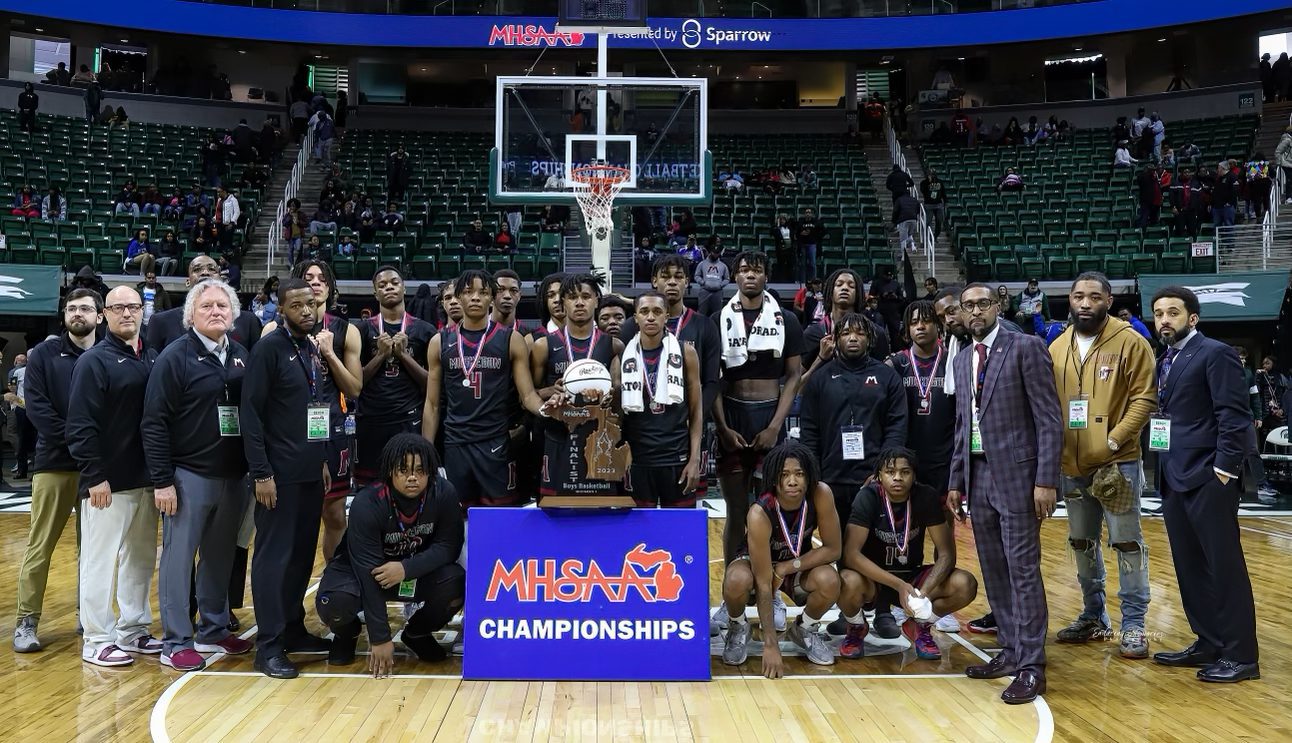West Michigan’s connection to the NFL was never more in-your-face than it was on December 15, 1963, when the pride of Shelby, defensive back Dave Whitsell, and the pride of Muskegon, quarterback Earl Morrall, were headline news on sports pages across the Midwest and beyond.
Surrounded by reporters, Whitsell discussed how he “pilfered Earl Morrall’s pass” in the fading seconds of the Western Division title game between the Chicago Bears and the Detroit Lions. “It was a gamble,” Whitsell told reporters. “I’d been playing (Detroit end Gail) Cogdill tight all day. I decided we needed the ball. Morrall fired it out there and I just cut in front of Cogdill and grabbed it.”
Nothing to Lose
Entering the game with a 5-7-1 record, the Lions were well out of the postseason picture. And as is often the case, there is nothing worse than facing an opponent that has nothing to lose.

Dave Whitsel
The Bears needed a win or a tie to clinch the West before the home crowd of 45,317 at bitter cold Wrigley Field. Chicago had beaten Green Bay’s “haughty wonder machine” twice during the season, but if the Bears lost to the Lions, it meant the Packers would qualify for a fourth straight trip to the league championship game.
A week earlier, the New York Giants had stitched up the Eastern Division title with assistance from Morrall and the Lions. Detroit had trounced Cleveland, 38-10 in record-setting fashion as Morrall, in his eighth season in the NFL, passed for 271 yards and two touchdowns, setting a new Lions single-season record for passing yardage. Entering the game, the Browns were in the thick of the race for the Eastern Division crown. Because of the loss, they were eliminated.
Edge of Your Seat Thriller
“More than 100 former Bear players sat thru the struggle, a prelude to their annual homecoming party,” stated the Chicago Tribune. Detroit held a 7-3 halftime lead, and the margin might have been larger were in not for a picked off pass in the end zone by the Bears’ Roosevelt Taylor. Coach George Halas’ squad regrouped at the intermission, then scored a pair of touchdowns in the third quarter to take a 17-7 lead. Morrall, a Muskegon High School graduate who had led the Big Reds to a state football crown in the fall of 1951, led the Lions on an 81-yard, nine play drive, climaxed by a 4-yard TD pass to Terry Barr to open the fourth quarter. Wayne Walker’s point after was good and, suddenly, the margin was three points, 17-14, in the maddeningly tight ballgame.
Gut Check Time
With two-and-a-half minutes to play, Detroit had driven to the Chicago 27, but came up empty-handed when, a fourth down pass from the 22 fell incomplete. Still, Morrall and the Lions had another chance with 53 seconds to play.
“But this time the Lions were anchored back on their 33-yard line,” stated the Detroit Free Press.
A pass to Barr moved the ball to the 36. That’s when Whitsell made his move.
Former teammates
“Dave called his shot,” said Richie Petitbon one of Whitsell’s companions in Chicago’s defensive backfield. “He told me earlier in the week he was going to get one of those ‘out’ passes Morrall likes to throw and go all the way with it.”
Three years before, Whitsell and Morrall were teammates in Detroit.
The intensity and excitement of Whitsell’s 39-yard pick-six can be seen on the internet in glorious black and white. For radio fans, the play is also available on the web, memorably conveyed in the voice of WGN radio play-by-play sportscaster Jack Brickhouse’s call of the game.
“He’s gonna go! He’s gonna go!” yells Brickhouse over the wild cheers of the fans when Whitsell stepped in front of Morrall’s pass. “Touchdown! Hey Hey! Oh Buddy! Woo Hoo!” The Bears finished with a 24-17 victory, and two weeks later downed the Giants, 14-10, for the NFL Championship in the days before the Super Bowl.
Whitsell
One of the greatest athletes to come out of the West Michigan Conference, Whitsell quickly distinguished himself as a star at Shelby High School, earning All-WMC basketball honors as a 5-foot-7 sophomore center in the winter of 1952. He would excel in three sports, competing in hurdle, broad jump and shot put events in track, and emerged as a standout in the backfield of Shelby’s football squad, although the team was far from stellar. The Tigers finished 2-8 in the fall of 1952, going winless in the tough conference. By 1953, Whitsell’s senior year, he had fully emerged. He averaged 16.7 yards per carry in the season opener, racking up 201 yards and four of Shelby’s six touchdowns in a 41-6 win over Ludington St. Simon. He scored the game’s opening TD in week two, and then passed for two more in a 25-0 win over Hesperia. The Tigers improved to 4-4 overall, but still won only a single game in the league. That victory, however, was impressive.“The biggest upset in the area was Shelby’s 32-6 triumph over Whitehall,” said the Ludington Daily News. “Dave Whitsell scored five touchdowns, one from 70 yards out, another from 75, one from 6, another from 21 and the final one of eight yards.”
His exploits earned him recognition on the All-WMC football team.
“It was a foregone conclusion that Whitsell would make the team in reviewing the outstanding record he has compiled with the cellar-dwelling Shelby team,” wrote the hometown Oceana Herald.
Individually, Whitsell was again outstanding during that basketball season, but was missed in the lineup during the latter part of the schedule. Montague’s 6-foot-8 center Jerry Brown scored 56 points against the Tigers in the second-to-last regular season game. Fouled repeatedly, Brown was only 8 of 22 from the charity stripe, but dropped 24 buckets from the field in an 82-46 thrashing.
Shelby finished with a 3-12 regular season mark.
The teams met again in the opening round of the MHSAA tournament played at Hart. The Wildcats again won, ousting Shelby from the postseason, 56-46.
This time, the athletic Whitsell was in the lineup and held Brown to 10 points over three quarters. The Tiger center, “picked up his fourth foul early in the fourth quarter,” recalled Daily News reporter George Wilson, “and had to be pulled off Brown, who started to score and led the Wildcats to victory. But it was beautiful to see Whitsell in his tremendous effort that night…”
Come track season, Whitsell, who had placed fifth in the high hurdles and fourth in the low hurdles as a junior at the MHSAA Class C state meet, finished as the state’s 1954 Class C Broad Jump champion, while earning second in both the 180-yard Low Hurdles and the shot. Thanks to his efforts, Shelby took 4th overall in their classification.
Word in Shelby was that the athletic standout would head to Michigan State to continue his playing career. Instead, he ended up at Indiana.
At IU, he was awarded freshman numerals in 1954. Generously listed at 6-foot and 176 pound, he was one of 14 possible varsity options on the roster at halfback in 1955, then snagged varsity letters for the Hoosiers as a junior and senior. In 1956, IU finished 1-5 in the Big Ten and 3-6 overall. Whitsell, scored twice on the year with a pair of TD receptions. He rushed for 240 yards on 58 carries.
In 1957 as a senior, he led Indiana in receiving with 14 receptions for 290 yards (second overall in the Big Ten) and two touchdowns, although the Hoosiers were a disappointing 1-8 on the year and were shutout five times. They finished a dismal 0-6 in the conference.
“I was at the MSU-Indiana game in 1957,” remembered Jim Moyes, Muskegon’s ‘ole’ announcer” and walking encyclopedia of sports memories. “Whitsell was the whole show for the Hoosiers as MSU destroyed them.”
An Unpolished Defensive Gem
The 1958 NFL draft went 30 rounds, and Whitsell – one of three IU players selected -was picked by the Lions, winners of the 1957 NFL championship, in the 24thround. One of four rookies vying for a spot in the secondary, he impressed and stuck in the Motor City for three seasons.In 1961, the NFL expanded to 14 teams with the addition of the Minnesota franchise, and Whitsell was one of the eight players exposed by Detroit for the draft. The Vikings selected Whitsell as one of their three picks from the Lions. Despite his status as “the smallest defensive player in football” at 5-foot-11 and 172 pounds, Whitsell’s “crackling tackles and great speed made him a sure grab,” according to the Free Press.
In July, the Vikings traded Whitsell to the Giants, and within days, the Giants had traded him to Washington. But Whitsell refused to report to Washington. Instead he was shipped to Chicago “in payment for place-kicker John Aveni, also a former Indiana University player.”
Despite the regular arrival of draft picks to challenge him for his spot on the roster, the undersized Whitsell became a mainstay of the Chicago defense, starting in all but one game during his six seasons with the Bears. “Persistent as a bloodhound,” he picked off 26 passes over the span and earned the nickname “Weasel” for his cunning style. The total still ranks sixth on the team’s all-time list. Ultimately, it took another expansion by the league to dislodge him from the team’s secondary.
At age 30, the Bears made Whitsell available as a possible pick when New Orleans became the league’s 16thteam in 1967
The Saints received lists of 11 players from each NFL team – excluding the one-year old Atlanta Falcons. In the first of three rounds of the expansion draft, New Orleans then selected a single player from each team. From Chicago, they chose Whitsell.
The veteran shocked everyone with his play for the Saints. His 10 picks in the fall of ‘67 tied with the total grabbed by Detroit rookie sensation Lem Barney for the NFL lead. Whitsell returned two for touchdowns. At season’s end, he was honored with selection to the Pro Bowl.
“Whitsell was the first true star in New Orleans Saints history,” states the Saints Hall of Fame, who enshrined the cornerback in 1996. “While he was not as celebrated as the additions of Jim Taylor, Paul Hornung and Doug Atkins, Whitsell was the most significant addition of all initially.”
He would stick around the NFL for another two years. In 1970, the Saints traded him to Dallas, as the Cowboys tried to shore up their secondary. During the pre-season, they opted to go with youth at the position and placed the 34-year-old Whitsell on waivers. “The Great Thief,” it was announced, retired at No. 2 all-time on the career interception list with 46, one behind Detroit’s Dick Lebeau. (Additional research into the history of the pro game in the years after his retirement show the total ranked 7that the time.)
The Whitsell Family fell in love with New Orleans and retired to Kenner, a suburb of the city. In 1989, he was enshrined into the third class of honored members of the Muskegon Area Sports Hall of Fame. Ten years later, he passed away at age 63.
*FOR A HARDCOPY OF THIS STORY, LOCATE THE LSJ’S SEPTEMBER MAGAZINE AT AREA BUSINESSES
https://www.youtube.com/watch?v=bXsjROYVAv8 – 29:38 mark









